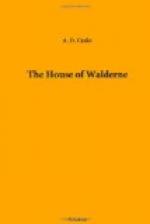At length Martin arrived at the house of the Franciscans, where he was eventually to lodge, but they had no room for him at this moment, hence he had been sent to a hostelry, licensed to take lodgers; much to the regret of Adam de Maresco. But he could not show partiality. Each newcomer must take his turn, according to the date of the entry of his name. The friary was on the marshy ground between the walls and the Isis, on land bestowed upon them in charity, amongst the huts of the poor whom they loved. At first huts of mud and timber, as rough and rude as those around, arose within the fence and ditch which they drew and dug around their habitations, but the necessities of the climate had driven them to build in stone, for the damp climate, the mists and fogs from the Isis, soon rotted away their woodwork. And so Martin found a very simple, but very substantial building in the Norman architecture of the period. The first “Provincial” of the Greyfriars had persuaded Robert Grosseteste, afterwards the great Bishop of Lincoln, to lecture at the school they founded in their Oxford house, and all his powerful influence was exercised to gain them a sound footing in the University. They deserved it, for their schools attained a reputation throughout Christendom, so nobly was the work, which Grosseteste began, carried on by his scholar and successor, Adam de Maresco.
And they had helped to make Oxford, as it was then, the second city of importance in England, and only second to Paris amongst the learned cities of the world.
Martin was shown along a cloister looking through the most sombre of Norman arches, upon a greensward. The doors of many cells opened upon it. He was told to knock at one of them, and a deep voice replied, “Enter in the name of the Lord.”
It was a large, plain room, with a vaulted ceiling lighted by lancet windows and scantily furnished; rough oaken benches, a plain heavy table, covered with parchments and manuscripts: in one recess a Prie-Dieu beneath a crucifix, and under the fald stool a skull, with the words “memento mori,” three or four chairs with painfully straight backs, a cupboard for books (manuscripts) and parchments, another for vestments ecclesiastical or collegiate. This was all which cumbered the bare floor. At the corner of the room a spiral stone staircase led to the bed chamber.
Before the table stood an aged and venerable man, in the gray clothing of the Franciscans, sweet in face, pleasant in manner, dignified in hearing, in reputation without a stain, in learning unsurpassed.
Martin bowed reverently before him, and gave him the chaplain’s letter.
“I had heard of thy arrival, my son. I trust thou hast found comfortable lodgings at the hostel I recommended?”
“I have slept well, my father.”
“And hast not forgotten thy duty to God?”
“I should do discredit to my teacher at Kenilworth if I did. I have been to the abbey church.”




